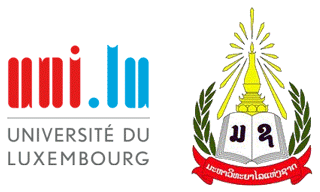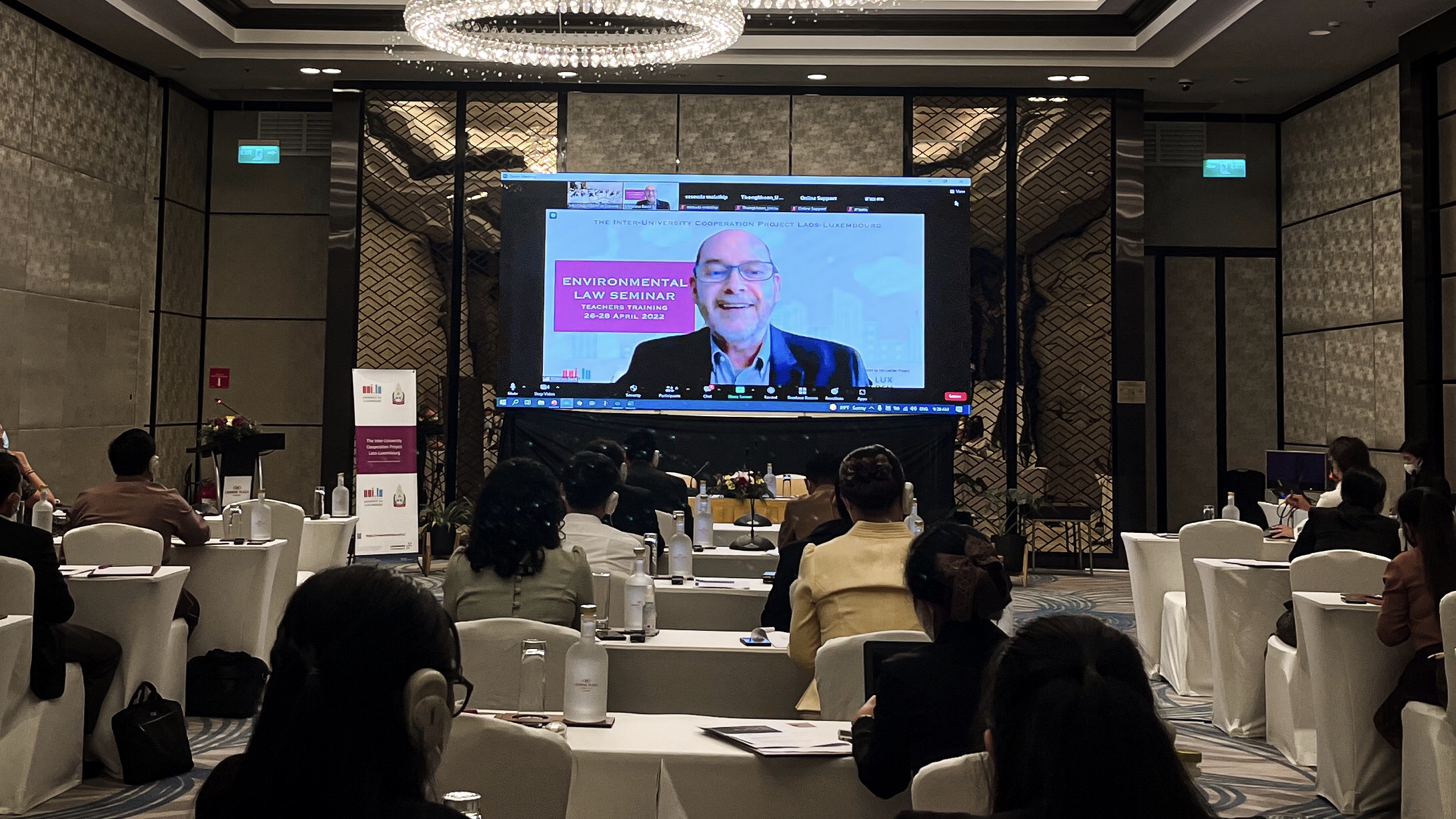ໃນຂອບເຂດວຽກງານ ຂອງໂຄງການຮ່ວມມືລະຫວ່າງມະຫາວິທະຍາໄລ, ມະຫາວິທະຍາໄລລຸກຊຳບວກ ໄດ້ໃຫ້ການສະໜັບສະໜູນ ການສິດສອນກົດໝາຍວ່າດ້ວຍສິ່ງແວດລ້ອມຢູ່ ສປປ ລາວ, ເຊິ່ງເປັນຫຼັກສູດວິຊາການທີ່ຈຳເປັນສຳລັບການພັດທະນາແບບຍືນຍົງ ແລະ ການປົກປັກຮັກສາດິນຟ້າອາກາດ. ການສຳມະນາ ກົດໝາຍສິ່ງແວດລ້ອມ ໄດ້ຈັດຂຶ້ນໃນວັນທີ 26-28 ເມສາ 2022 ທີ່ນະຄອນຫຼວງວຽງຈັນ ໃນຮູບແບບປະສົມປະສານ ເປັນເວລາ 3 ມື້. ການສຳມະນາຄັ້ງນີ້ ເປັນການຈັດການສຳມະນາແບບເຊີ່ງໜ້າຄັ້ງທໍາອິດໃນປີນີ້, ຫຼັງຈາກຂໍ້ຈໍາກັດຈາກ ສະຖານະການ Covid-19, ຜູ້ເຂົ້າຮ່ວມສາມາດເຂົ້າຮ່ວມກິດຈະກໍາເຊິ່ງຫນ້າໄດ້, ໃນຂະນະທີ່ຜູ້ບັນຍາຍ ໄດ້ໃຫ້ການສໍາມະນາຜ່ານ Zoom. ການສຳມະນາຄັ້ງນີ້ໄດ້ເນັ້ນໃສ່ເນື້ອໃນຫລັກສູດ ແລະ ທັກສະການສອນກົດໝາຍສິ່ງແວດລ້ອມ ເພື່ອສ້າງຄວາມເຂັ້ມແຂງໃຫ້ແກ່ຄູສອນກົດໝາຍສິ່ງແວດລ້ອມ ຈາກຄະນະນິຕິສາດ ແລະ ລັດຖະສາດ, ມະຫາວິທະຍາໄລແຫ່ງຊາດ, ຄະນະນິຕິສາດ ແລະ ບໍລິຫານ, ມະຫາວິທະຍາໄລຈໍາປາສັກ ແລະ ສະຖາບັນຍຸຕິທຳແຫ່ງຊາດ.

ການສຳມະນາກົດໝາຍສິ່ງແວດລ້ອມຄັ້ງນີ້ ຈັດຂຶ້ນໂດຍການຮ່ວມມືລະຫວ່າງ ທ່ານ Matthew Baird, ຜູ້ອໍານວຍການສະຖາບັນຄົ້ນຄວ້າກົດໝາຍສິ່ງແວດລ້ອມອາຊີ (ARIEL) ແລະ ປະສານງານໂດຍ Dr. Perrine Simon (ຜູ້ປະສານງານຂອງ Uni.lu). ທ່ານ Matthew Baird ເປັນທະນາຍຄວາມທີ່ມີຄວາມຊ່ຽວຊານທາງດ້ານກົດໝາຍສິ່ງແວດລ້ອມ ແລະ ມີປະສົບການອັນກວ້າງຂວາງ ໃນການຝຶກອົບຮົມຄູໃນອາຊີຕາເວັນອອກສຽງໃຕ້ ໂດຍໄດ້ຊ່ວຍເຫຼືອ ທະນາຄານພັດທະນາອາຊີ ໃນການພັດທະນາໂຄງການ Train the Trainers ສໍາລັບການພັດທະນາຄວາມສາມາດຂອງນັກວິຊາການດ້ານກົດໝາຍສິ່ງແວດລ້ອມໃນອາຊີ, ເຊິ່ງດໍາເນີນຢູ່ ກຳປູເຈຍ, ໄທ, ມຽນມາ ແລະ ຟີລິບປິນ.
ໃນພາກເຊົ້າແມ່ນໄດ້ ສຸມໃສ່ການບັນຍາຍ, ໃນຂະນະທີ່ພາກບ່າຍ ໄດ້ເຮັດກິດຈະກໍາ ແລະ ມີການສົນທະນາເປັນກຸ່ມ. ຜູ້ເຂົ້າຮ່ວມໄດ້ຮັບຫຼັກສູດ ລວມທັງຂໍ້ມູນອ້າງອີງສໍາລັບການຮຽນຮູ້ ແລະ ການສອນກົດຫມາຍສິ່ງແວດລ້ອມເຊັ່ນ: ຫຼັກສູດອອນໄລນ໌, ເອກະສານປະກອບການບັນຍາຍ, ແບບຂອງຫຼັກສູດ, ແລະ ຍັງໄດ້ຮັບອະນຸຍາດໃຫ້ເຂົ້າເຖິງໂຟລເດີ ລວມທັງແຫຼ່ງຂໍ້ມູນ ທາງເອເລັກໂຕຣນິກທີ່ສໍາຄັນ.

ມື້ທໍາອິດຂອງການສໍາມະນາແມ່ນໄດ້ລົງເລິກ ແນະນໍາກ່ຽວກັບກົດຫມາຍສິ່ງແວດລ້ອມ ແລະກົດຫມາຍສິ່ງແວດລ້ອມສາກົນ ແລະ ປະຕິບັດກັບຫຼັກການພື້ນຖານສິ່ງແວດລ້ອມ ແລະ ເຄື່ອງມືສາກົນ, ເຊີ່ງກວມເອົາທັງ hard law ແລະ soft law.

ໃນຕອນບ່າຍ, ພວກຂ້າພະເຈົ້າໄດ້ຕ້ອນຮັບ Dr. David J. Devlaeminck ຜ່ານ Zoom, ເຊິ່ງເປັນອາຈານສອນຢູ່ໂຮງຮຽນກົດໝາຍ, ນະຄອນ Chongquing ເພື່ອນຳສະເໜີກ່ຽວກັບກົດໝາຍວ່າດ້ວຍນ້ຳ, ໂດຍເນັ້ນກ່ຽວກັບສົນທິສັນຍາວ່າດ້ວຍສາຍນ້ຳ ແລະ ອ່າງແມ່ນ້ຳຂອງກັບສັນຍາແມ່ນ້ຳຂອງ, ສັນຍາແລກປ່ຽນຂໍ້ມູນຂ່າວສານສອງຝ່າຍ, ແລະ Soft Instruments. ຈາກນັ້ນ, ສາດສະດາຈານ Amanda Kennedy (ຄະນະນິຕິສາດ, ມະຫາວິທະຍາໄລເຕັກໂນໂລຍີ Queensland, ແລະ ປະທານຮ່ວມຂອງຄະນະກຳມາທິການການສອນ IUNC AEL), ໄດ້ນຳສະເໜີ “ການສອນກົດໝາຍສິ່ງແວດລ້ອມດ້ວຍສິລະປະການສອນ ແລະ ການປະຕິບັດຕົວຈິງ”. ຜູ້ເຂົ້າຮ່ວມ ໄດ້ຮັບຄຳແນະນຳ ທິດສະດີການຮຽນຮູ້ທີ່ແຕກຕ່າງກັນ ແລະ Bloom’s Taxonomy, ທີ່ກ່ຽວຂ້ອງກັບຜົນການຮຽນຮູ້, ວິທີການປະເມີນຜົນ, ແລະ ກິດຈະກໍາການຮຽນຮູ້.

The second day of the seminar was devoted to teaching Environmental Impact Assessment (EIA) and Comparative Environmental Law; teaching Climate Change Law and Litigation; and International Environmental Law with Matthew Baird. Dr. Perrine Simon led group discussions on curriculum design in the afternoon, where participants had to work in groups and choose one topic related to Environmental Law, such as Climate Change, International Legal Regime, International Environmental Law, and Natural Resources Law, and design their own curriculum on environmental law, including the content, learning objectives, and lesson plan. The other discussion topic was on pedagogy, where participants had to look back at their lesson plan and propose the learning activities or exercises to run with the students.

On the last day of the seminar, we had the chance to welcome Associate Prof. Jonathan Liljeblad from the Australian National University via Zoom to discuss designing Environmental Law curriculum. Participants also experienced blended learning and asynchronous teaching by watching a recorded lecture on “Human Rights and the Environment” prepared by Ass. Pr. Liljeblad. The final session with Mr. Baird dealt with resolving environmental disputes (environmental courts), environmental crime, and environmental justice. In the afternoon, we had a group discussion on reflective practice with Dr. Perrine Simon. Lecturers highlighted as their main challenges the lack of resources and of teaching tools, together with difficulties in communicating and transferring knowledge to students. They praised the access to teaching material and learning about pedagogy acquired during this 3-day event.

The participation of the lecturers of the Faculty of Law and Administrative of Champassak University and of the National Institute of Justice was made possible with the financial support of the LuxDev Project LAO/031.

